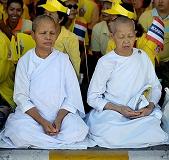THAILAND: LITTLE HOPE FOR NUNS IN NEW DRAFT BILL
May 8, 2008
 BANGKOK, Thailand – Any mae chee or white-robed nun who believes she will get legal status as a monastic member under new legislation pushed by the elders will be in for a big disappointment.
BANGKOK, Thailand – Any mae chee or white-robed nun who believes she will get legal status as a monastic member under new legislation pushed by the elders will be in for a big disappointment.
No, the nuns will not get any legal status as clerics. That is crystal clear in the Support and Protection for Buddhism draft bill. Worse, any freedom they enjoy now will be clipped.
Don’t blame the nuns if they feel betrayed.
It is a well-known fact that our home-grown mae chee have long suffered lack of support for their spiritual pursuits, being primarily treated as temple hands.
They must have welcomed the change when the Office of National Buddhism announced that it was sponsoring a bill that would recognise nuns as clerics and support their dharma work.
Who can blame their optimism? Amnart Buasiri from the Ecclesiastical Council Secretariat himself said the bill would make the nuns nak buat or clerics.
But truth be told, the draft bill does not define the nuns as clerics. The mae chee, it says, are practising Buddhist laywomen or upasika who wear white robes, shave their heads, observe eight precepts and live a homeless life.
And although the draft bill will not recognise the mae chee as monastic members, it orders mae chee to be under the clergy’s control.
When it comes to financial support for the mae chee’s work, however, the clergy wants nothing of it. The draft bill clearly stipulates that this is the government’s duty, not the clergy’s.
Wonder why many women seek the path of Bhikkhuni? Or why many prefer to engage in dharma work independently?
Before the setting up of the Nuns Institute, a self-regulated body, the nuns were under the clergy’s paralysing control which chained them to temple kitchens, said senior mae chee Arun Pet-urai.
Her call for clarification of mae chee’s rights in the new structure does not only echo her peers’ concerns, it also shows they have not been consulted at all.
Talk about lack of respect.
Interestingly, the elders’ draft bill does not mention the Nuns Institute at all. The nuns, it says, must be under direct control of the clergy.
Get the picture?
If the nuns get a poor deal in the Support and Protection for Buddhism draft bill, it is because the clergy’s principal goal is not about justice but power.
Out of 43 articles, only one is about the mae chee. The full control of mae chee, to be exact.
The rest is about getting the government to pay for the clergy’s propagation work and to protect them from perceived threats – particularly the mass media.
It is a watered-down version of the same draft bill which was rejected by the National Legislative Assembly last year. Remember its controversial clause on monks’ sexual misconduct which punished only women, not the monks?
This clause has been removed. But the rest is more of the same, although legal punishment has been reduced.
For example, the punishment for the mass media for portraying the clergy in a bad light is a maximum five years’ jail term and/or 100,000 baht fine, down from 10 years and 500,000 baht.
Still, this is much higher than legal punishment in the defamation law.
The same severe punishment is meted out for those perceived to “imitate” and “distort” the teachings – a stern message for new religious groups, particularly the emerging Bhikkhuni movement.
And although religious sites, icons and rituals are cultural matters that change over time and vary from place to place, the clergy prohibits any changes without its approval.
Those who do so face heavy punishment.
The message is clear. The clergy owns the teachings, the rituals, the icons, the sites. They alone can reap the benefits.
For accuracy, this draft bill should be called the Support and Protection of the Clergy, not Buddhism.
For clearly this is but a case of abusing Buddhism for clique power.
By Sanitsuda Ekachai – Assistant Editor (Outlook)
Source : Bangkok Post




